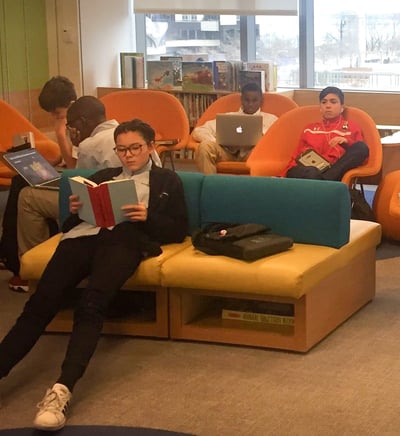DIGITAL OR PRINT, ENGAGEMENT WITH BOOKS IS WHAT MATTERS
December 7, 2016 admin Technology, Education, GEMS World Academy Chicago, Literacy
The experience of reading has changed dramatically during the past decade or so. Traditional print books remain the format of choice for most American readers, but a growing percentage is choosing to read e-books on a variety of devices — dedicated e-readers, tablets and even smartphones.
Schools sit on the front lines of this evolution in reading habits. Most of today's teachers grew up with print books as the only reading option, but their students are comfortable (and in fact might prefer) reading on multiple platforms. So teachers are rethinking what "reading" means, and they are paying close attention to the different ways students engage with texts.
So far, general research on the subject of digital vs. print reading is mixed. Some research suggests that people read more quickly from tablets than from paper. In particular, elderly people often find it easier to read from a screen because the high contrast is easier on the eyes. On the other hand, another study involving 10th-graders showed that students who read on paper remember more of what they read. This could be because the physical act of turning pages and touching the paper creates stronger memories.
When researchers repeated their experiments, they found that students who struggled to remember information when reading from a tablet on their first attempt improved their performance significantly in repeated tests. If you currently find it difficult to learn from digital textbooks, this result is encouraging, as it suggests that practice will help you get better at this new style of learning.
 Digital textbooks can have many advantages over printed textbooks. Electronic texts can be enhanced with features such as the ability to search for key terms or definitions that appear when you mouse-over or tap a word. Some digital textbooks even contain interactive tests, sounds or videos to enhance your learning and test your understanding of the material, and more enhancements to digital books could be on the way. E-books that are simply copies of their printed versions don't offer significant advantages, but digital texts that make full use of the features available in the digital format are becoming increasingly popular with students and teachers.
Digital textbooks can have many advantages over printed textbooks. Electronic texts can be enhanced with features such as the ability to search for key terms or definitions that appear when you mouse-over or tap a word. Some digital textbooks even contain interactive tests, sounds or videos to enhance your learning and test your understanding of the material, and more enhancements to digital books could be on the way. E-books that are simply copies of their printed versions don't offer significant advantages, but digital texts that make full use of the features available in the digital format are becoming increasingly popular with students and teachers.
Given the inconclusive nature of research on the subject, many teachers are reluctant to adopt a "one-size-fits-all" approach. At GEMS World Academy-Chicago, teachers deploy a mix of printed and digital texts in the classroom.
"My preference is that kids read and engage with the material whichever way they can," said Jay Annadurai, a GEMS humanities teacher. "The goal is to help students develop a love of reading and encourage them to be lifelong readers. I think in order to reach that goal, educators have to be willing to drop some 'rules' and let students explore texts in ways that make sense to them."
Annadurai said that many of her students prefer printed books over digital versions, with some pointing out that print gives them a chance to "unplug" from the distractions that tablets and smartphones can create. Others, though, say they like the special annotation features built into many digital texts.
| Teachers are rethinking what "reading" means, and they are paying close attention to the different ways students engage with texts |
Bridget Porterfield, another GEMS teacher, said it's crucial for teachers to encourage students, especially those in the higher grades, to take ownership of their reading choices.
"As students reach middle- and high-school age, they should start to know who they are as readers and make those choices themselves," she said.
Constance Charles, the librarian at GEMS World Academy, said that teachers' willingness to use both print and digital reading material is reflected in the library's resources, which include books in a variety of formats.
Looking ahead, it's clear that digital reading will continue to grow in popularity, both in schools and among the general reading public. That's why educators, scientists and other experts are searching for ways to encourage deep, focused and attentive reading on digital devices.
In the meantime, schools like GEMS are finding that providing students a choice of reading formats leads to a more profound engagement with the texts, which remains the primary goal for all who have a stake in education.